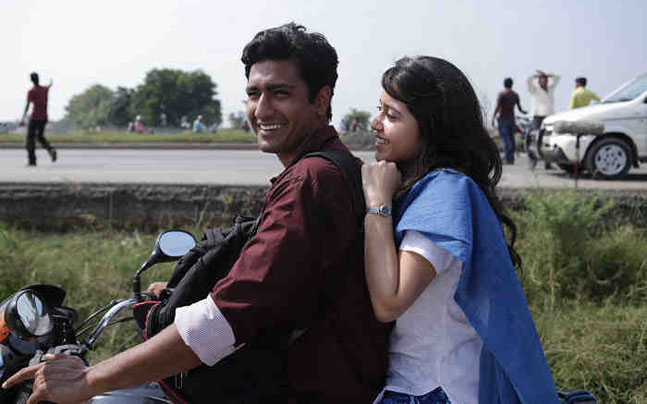Tu kisi rail si guzarti hai..main kisi pul sa.. thartharata hoon (You pass by like a train…I shudder, pulse like a bridge).
These lines from a Dushyant Kumar poem in Neeraj Ghaywan’s debut film Masaan, take you back to the terrace of a small town home where in the middle of the night, you heard the cry of a distant train with longing.
You remember the poets who shaped your idea of love, of life. Ghalib, Bashir Badr, Fazli. You remember that even today, in certain Indian towns, little things are big things. And a young girl perhaps still recites poetry to her beau over a phone. When the question, “ab toh hum friends ho gaye hain?” is supposed to imply much more than what a casual chat on Facebook and a few glances shared across a Durga pooja melee, can convey.
When a balloon let loose in the night sky is about the unbearable joy that love is and also about fate that will steer us wilfully to skies as hollow as a ravine (Ulta karke dekh sake to Ambar bhi hai gehri khaayi). When Deepak and Shalu, two wide-eyed young people, as yet innocent of the caste divides between them, sit in a cafe to share a pizza and shy banter, you remember Sai Paranjpey’s Chashme-Baddoor. That scene when Farooque Sheikh and Dipti Naval on their first date, share a Tootie-Fruity and a coffee with undisguised happiness in each other’s company. And you thank God that our cinema has not forgotten how extraordinary an ordinary love story can be. When the two steal a day to ride away from their small town, a song from Qayamat Se Qayamat Tak (a film about star-crossed lovers) plays in the backdrop to sum up their joy and hint at what lies ahead.
The portents follow the characters of the film relentlessly. So when Shalu narrates these Bashir Badr couplets to Deepak, “Chiragon ko mehfooz rakhenge aankhon mein..badi dur tak andheri raat hogi..musafir hai hum bhi.. musafir ho tum bhi..phir kahin kisi mod pe mulaqat hogi (Let us keep the lamps of hope alight in our eyes..relentless and dark will be the night…you are a traveller and so am I..somewhere..we will meet..and unite),” a sense of foreboding is almost tangible.
And more signs follow. Like when a young couple walks towards a secretive tryst in a seedy hotel, a bunch of mannequins watch them disapprovingly. In their dark hotel room, the TV blares on about a man caught in the enclosure of a tiger, hinting at the events that will follow.Many such moments in Masaan bring you face to face you with the space between what is..and was. Between hope and inexorable destiny. Between snatches of overflowing life and the finality of a funeral pyre. The Masaan, or ‘Shamshaan’ is a metaphor in the film for scavenging for hope in ashes and for letting go what cannot be reclaimed. This is where stories begin, end and converge.The ironically named Devi (Richa Chaddha) plays a young woman shamed for her desire for the man she loves and then finds in her, enough resilience to win back her dignity. Watch her mourn and release a love that was almost hers. Her defiant gait, flashing eyes, measured one-liners show how strong she is despite being reduced to a video clip.
There is the almost unbearably poignant Sanjay Mishra, finding a thread of compassion and respect for his daughter in an impossibly dark situation.The find of the film is however Vicky Kaushal..a young actor who inhabits Deepak with every soul muscle he can muster. He is an aspiring civil engineer, the lone hope of a family of traditional pyre lighters, a boy in the throes of deep love, smiling to himself as he sees the Facebook profile of his beloved, hears her voice on the phone. And that scene where he is reciting a poem she loved, wracked with the question, “Ye dukh khatm kyon nahin hota?”
And there is Shweta Tripathi with her untutored loveliness and the assurance of a born actor. This film is a gently defiant reaction to the cinema of multi-crore hyperbole as it tells a human story that both breaks your heart and uplifts your spirit. A film that draws on the ugliness of tradition and the beauty of human courage that like the polluted Ganges flowing by a ghat ablaze with death, finds a reason to go on. To another town. Another life. To come full circle. Take a bow Neeraj Ghaywan. And Varun Grover whose screenplay is both poetry and pain. And tells us of all those who chase the smell of ‘kasturi’ in a ‘dasturi’ (moribund) world. Don’t miss this one.
 with The New Indian Express Reema Moudgil works for The New Indian Express, Bangalore, is the author of Perfect Eight, the editor of Chicken Soup for the Soul-Indian Women, an artist, a former RJ and a mother. She dreams of a cottage of her own that opens to a garden and where she can write more books, paint, listen to music and just be silent with her cats.
with The New Indian Express Reema Moudgil works for The New Indian Express, Bangalore, is the author of Perfect Eight, the editor of Chicken Soup for the Soul-Indian Women, an artist, a former RJ and a mother. She dreams of a cottage of her own that opens to a garden and where she can write more books, paint, listen to music and just be silent with her cats.







As always, beautiful, mellifluous like music for the soul, words flowing like smooth silk and emotions captured like never before.
Brilliant writing Reema. Love – Sonali
thanks my dear